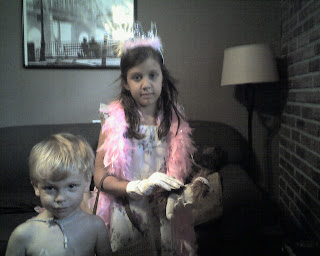This is an old review I wrote about Cormac McCarthy's 2005 book
No Country for Old Men. I'm posting it because since this McCarthy has published two more books,
The Road and the play
The Sunset Limited, both of which seem to support my main thesis below. (Plus,
No Country for Old Men is being made into a movie by my faves the Coen brothers).
Cormac's latest
Despite being spoofed by Wes Anderson in
The Royal Tennenbaums, Cormac McCarthy is still one of my favorite contemporary novelists. I just finished his latest,
No Country for Old Men. The pace is similar to that of
Blood Meridian, and
No Country has already been compared to it in terms of its violence. (By the way, the violence of this latest book doesn't come close to
Blood Meridian, which is still, by far, the most violent book I've ever read). The body count is high, and also like
Blood Meridian, much of the carnage is caused by a mysterious, nearly supernatural figure of evil, Anton
Chigurh. These men haunt McCarthy's other novels, including
Outer Dark,
Child of God and The Border Trilogy, and are the subject of most of the metaphysical speculation that takes place among the characters.
The worldview presented in McCarthy's books seems to be similar to some ancient form of gnosticism. (Modern self-described gnostic Harold Bloom discusses this in his introductory essay to
Blood Meridian included in the Library of America edition). But it's a gnosticism that posits evil, not good, as the primary supernatural reality. History and human beings are strictly determined, infected with evil from the beginning and fated for a life of suffering, conflict and (of course) violence. "You think people was meaner then than they are now? the deputy said. The old man was looking out at the flooded town. No, he said. I don't. I think people are the same from the day God first made one" (
Child of God, 168). The bleak nihilism that results can be seen most clearly in
Blood Meridian: "You can find meanness in the least of creatures, but when God made man the devil was at his elbow" (19). The book's Judge Holden is the most philosophically articulate of McCarthy's characters: he describes the true nature of the world as "a hat trick in a medicine show, a fevered dream, a trance bepopulate with chimeras having neither analogue nor precedent, an itinerant carnival, a migratory tentshow whose ultimate destination after many a pitch in many a mudded field is unspeakable and calamitous beyond reckoning" (245). He sees war as "the truest form of divination. It is the testing of one's will and the will of another within that larger will which because it binds them is therefore forced to select. War is the ultimate game because war is at last a forcing of the unity of existence. War is god" (249). Holden at times sounds like the wild west's answer to Nietzsche: "Moral law is an invention of mankind for the disenfranchisement of the powerful in favor of the weak" (250). And: "Only that man who has offered up himself entire to the blood of war, who has been to the floor of the pit and seen horror in the round and learned at last that it speaks to his inmost heart, only that man can dance" (331).
On the surface
No Country for Old Men seems to mark something of a change for McCarthy. The principle "old man" in the story, Sheriff Bell, establishes a strong moral tone throughout the book in his italicized soliloquies included at the start of the chapters. In these sections Bell laments the moral state of contemporary America with its mindless violence and concludes that society has grown worse, evil more rampant. The principle cause of his concern is the string of murders committed by Chigurh, who appears as the perfect killing machine. Chigurh spouts a similar brand of nihilism as the other villains in McCarthy's
ouvre. But this time his perspective is answered at much greater length by Bell's ruminations.
Bell's moralism has been ridiculed by a
New York Times reviewer as "red-state" ruminations that may indicate McCarthy's descent into a kind of fundamentalist stupor in his old age. Not only is this line of thinking completely asinine, it misses the point of Bell's sections which conform to a pattern present throughout McCarthy's fiction. All of his primary villains have moralist counter-parts who, to wildly varying degrees, try to resist the total domination of evil but always to no avail. Think of The Kid and the ex-priest in
Blood Meridian, and the young cowboy protagonists in The Border Triology. Though these men often speak with a sense of moral hope, they are always defeated in the end; more precisely, the majority of them end up on the slab.
Sheriff Bell is no different from these earlier good characters, except that he escapes death by abandoning his pursuit of Chigurh. However, this "defeat" is "more bitter to him than death" (306) because he must live with his moral failure, all the while knowing that Chigurh is still at large. In this aftermath Bell confesses in total despair: "I don't have no answer to take heart from" (303). He is, like the rest of the old people he discusses throughout the book, completely lost and adrift in a world plagued by unfathomable and invincible evil.










